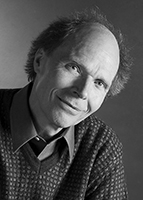 Eberhard Riedel is a photographer, clinical social worker, Jungian psychoanalyst, and teacher living in Seattle, Washington. He graduated in documentary and fine arts photography from the
Photographic Center Northwest, earned a Masters in Clinical Social Work from the University of Washington, a Diploma in Analytical Psychology from the Inter-Regional Society of Jungian Analysts, and a Ph.D. in Physics from the Technische Universität in Munich, Germany.
Eberhard Riedel is a photographer, clinical social worker, Jungian psychoanalyst, and teacher living in Seattle, Washington. He graduated in documentary and fine arts photography from the
Photographic Center Northwest, earned a Masters in Clinical Social Work from the University of Washington, a Diploma in Analytical Psychology from the Inter-Regional Society of Jungian Analysts, and a Ph.D. in Physics from the Technische Universität in Munich, Germany.
Riedel felt he needed to move beyond the confines of his consulting room and make use of his professional and life experiences in a world in which recurring racism, tribalism and fundamentalist ideology are tearing apart the human fabric. Through extensive fieldwork and research in Africa he learned that any attempts to create conditions for reconciliation and lasting peace must address the psychological injuries of participants and survivors of war and tribal violence.
Riedel conceived the idea to use photography for healing and peace in 2004. Photographing in a remote village in South Africa, he found himself surrounded by curious children who wanted to know about his camera and offered to carry his equipment. As a psychotherapist specializing in the treatment of trauma he had used play and art therapy in treating children who had suffered trauma and abuse. He knew at once, here was the perfect tool to engage trauma survivors and bridge cultural divides. Two years later, in 2006, he initiated the Cameras without Borders - Photography for Healing and Peace project.
During the first five years, Riedel served more than five hundred child and adult survivors of war-related trauma in psychotherapeutic Cameras without Borders workshops – mostly in crisis areas in Uganda and the eastern Democratic Republic of the Congo (DRC). In these photography workshops Riedel loans participants cameras and invites them to explore their worlds through creating photographic images. Thus he provides a milieu in which evocative images slowly open participants to powerful affects associated with their emotional wounds. Words and stories then emerge that narrate what truly matters in the struggle for liberation from the emotional prison that trauma is. The universal issue is: The struggle of giving birth to one's future. For details please see a recent article (Riedel, 2013) and "Second Letter from Eastern Congo" in the Blog section.
A thread that runs through Riedel's photographic and psychosocial work is inspired by an observation of Dr. Martin Luther King, Jr., "We are caught in an inescapable network of mutuality, tied in a single garment of destiny." Riedel's photography is sensitive to interpersonal dimensions and the cultural environment in which he works. Right from the beginning he strived not only to document and advocate but also to set into motion processes in which survivors of war and violence are better able to tend to their psychological injuries and communities are motivated to break the cycle of violence.
Formative experiences in the eastern DRC (since 2011), northern Uganda, southern South Sudan, and western Kenya have led to a much expanded scope of the Cameras without Borders - Photography for Healing and Peace project, which now includes a comprehensive trauma management program in the eastern DRC that deals with community trauma holistically, as well as an appointment as distinguished Visiting Lecturer at the School of Psychology at Makerere University in Kampala, Uganda. Since 2013, the Mobile Clinic Trauma Management Program (MCP) has provided medical and psychosocial services to about 2,500 female and male survivors of serious war-related sexual atrocities and torture, initiated vocational training projects and economic community development, and supports training programs for professionals and volunteers. Riedel published a first journal article that describes the conceptual advances in his study and treatment of collective community trauma, and recognizes the cyclical nature of the relation between psychological trauma, cycles of violence and serious social problems. For details please see his recent article (Riedel, 2014) and summary of his presentation "On the Art of Social Transformation" in the Blog section.Future Plans: Cameras without Borders - Photography for Healing and Peace has been engaged in several projects in eastern Congo since 2011, and conducted extensive fieldwork there again this past summer, 2015. Work in collaboration with faculty at Makerere University in Kampala, Uganda, on developing an East African Interdisciplinary Trauma Center is proceeding. A return visit for teaching and fieldwork in Uganda, South Sudan, and Kenya is planned for the winter of 2015/16. For comments, suggestions and inquiries please use the contact information below.
Acknowledgements: Cameras without Borders gratefully acknowledges generous support from Friends of Cameras Without Borders and the Pettit Foundation, and sponsorship by the Blue Earth Alliance. Blue Earth acts as fiscal agent with not-for-profit status under section 501(c)(3) of the US Internal Revenue Service code for Cameras Without Borders. Riedel much appreciates family, friends and supporters of Cameras without Borders - Photography for Healing and Peace for purchasing photographs, making generous contributions and publicizing the project's efforts in Africa. He thanks Glazer’s Camera in Seattle, WA, for assistance, including with supplies for photographic workshops. Last but not least, Riedel deeply appreciates the many individuals, organizations and communities in Africa for their trust, support and hospitality without which collaborations the work of Cameras without Borders - Photography for Healing and Peace would not be possible.
Contact Information:
Electronic mail: ERPhoto@cameraswithoutborders.org
Web sites: www.eberhardriedel.com and www.cameraswithoutborders.org